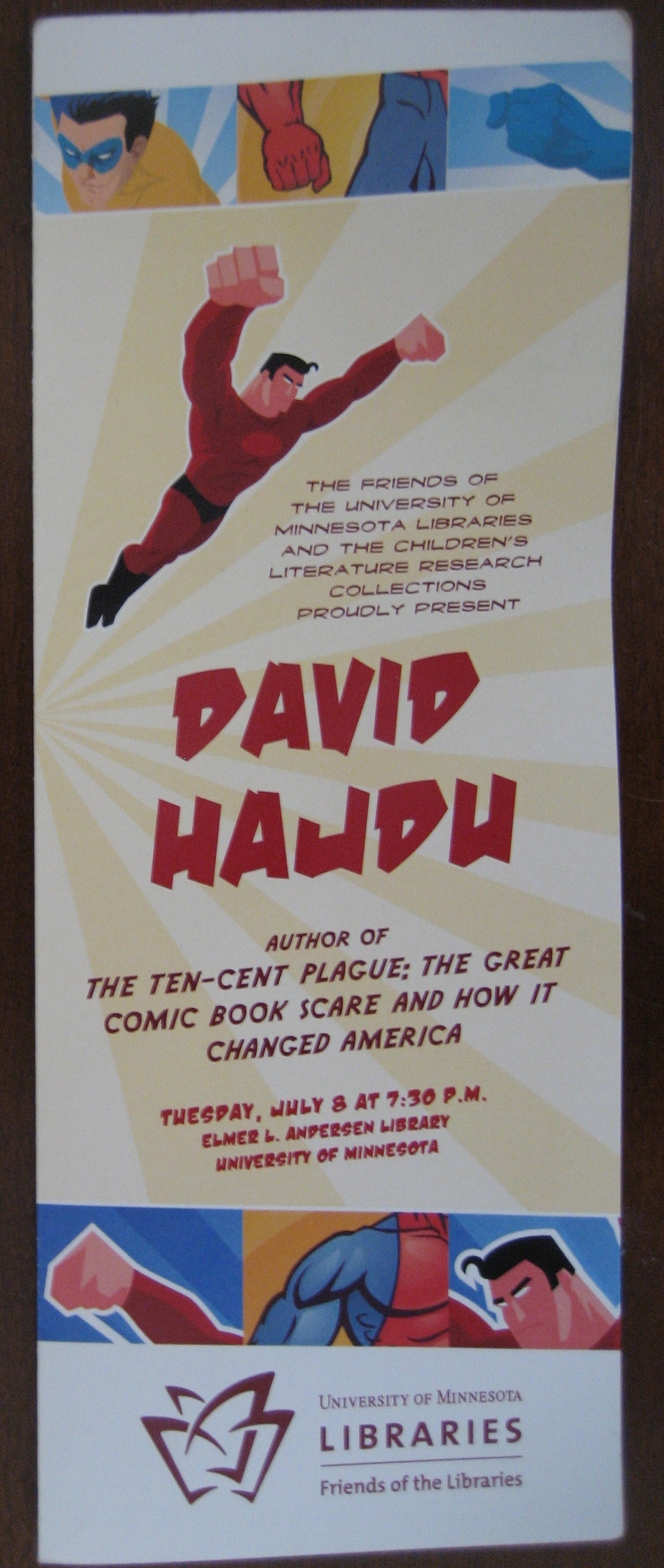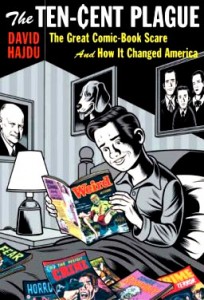The John Philip Borger Comic Book Collection at the University of Minnesota Libraries
September 12th, 2008 by Martin Some of you may remember that Jason and I attended a reading/presentation by David Hajdu last July at the Anderon Library on the west bank of the University of Minnesota Twin Cities campus. The event was to celebrate John Borger’s gift of almost 40,000 comic books to the Children’s Literature Research Collections department, a gift that was given a bit of press back when it happened.
Some of you may remember that Jason and I attended a reading/presentation by David Hajdu last July at the Anderon Library on the west bank of the University of Minnesota Twin Cities campus. The event was to celebrate John Borger’s gift of almost 40,000 comic books to the Children’s Literature Research Collections department, a gift that was given a bit of press back when it happened.
David Hajdu’s presentation was interesting. He seemed a bit nervous that both Gordon Purcell and Dan Jurgens were in attendance. And while I really had attended the event just to see David Hajdu, I found myself more and more interested in comic book donation, and the implications it had for the University having, suddenly, at its disposal such a glut of comic books.
I had the good fortune, after the event, of finding out I have mutual friends in common with Marie J. Harvat, who is the Library Supervisor in charge of the Borger collection. I soon corresponded with her, and she was happy to answer the following questions I had about dealing with such a large collection, including the process of keeping track of the comics, and her knowledge of implications for the University.
1. Would you be willing to describe the method being used to catalog and keep track of the comic books in the collection? Was there existing database software used for this project, or was a custom database created? Are the comics being scanned with a barcode reader? How many
people are taking part in this endeavor?Marie: The Borger Collection came to us with a copy of Mr. Borger’s personal ComicBase database listing. The CLRC purchased a copy of this software to be able to manipulate the data. While there are some very nice features in ComicBase, its is not something that the Libraries are able to use for patron searching.
It was decided that we would use Encoded Archival Description (EAD), a form of XML, to list the comics in the collection. Rather than type all the information desired (title, illustrator, publisher, character appearances, etc), I have been able to export data from ComicBase into a tab delimited file and into Excel. The staff discussed which “fields” to include and I compared these to established EAD elements to create a template for XML coding. This drove the massaging of the Excel spreadsheet to facilitate using another software to convert from spreadsheet columns into a page of code, thereby eliminating the need to hand code all 36,000 comic issues!
At present, I am the lead staff person on this project. We have one temporary part time assistant who is inputting additional information into a spreadsheet and placing the comics into new acid free boxes (smaller than those donated by Mr. Borger as to be more manageable and fit on the storage shelves better. Each comic is going in an acid free mylar sleeve and has an acid free “tag” slipped in the bag as to indicate its Box #, Folder #, Title, Date, and Issue #. In time we will have a second assistant to help push the project along more rapidly.
2. What is the timeline for making the comic books available to the public?
Selected comics are already available to the public. If you visit:
http://special.lib.umn.edu/clrc/borger/, and click on the left hand “Finding Aid” the list of processed comics appears. This is being updated at least on a weekly basis, and you can probably quickly tell that I have not finished tweaking the display. This project has been a great way for me to learn XML and XSL — but as I’m teaching myself while working this, some things will be a little messy for a while in the name of getting the title and issue numbers for processed comics out to the public.We hope to have processing completed by the end of 2008.
3. I know some Comic Books are already available, what does a person need to do to have access to these comics?
We are suggesting that interested patrons consult the finding aid. Any item listed there is currently available to be read in our reading room — 6 issues may be had on the table at one time; patrons may only have a laptop and a few sheets of paper with a pencil on the table while comics are in use. At the librarian’s discretion (read: if I can make it happen), other titles might be available and users are encouraged to inquire at clrc@umn.edu if they would like to see something that isn’t yet processed. In general, we strongly suggest making an appointment in advance notice for use of the Borger Collection. Again email clrc@umn.edu. A picture ID will be requested upon registration with the collection (a simple form), so don’t forget a wallet!
4. Does the library have any plans for accepting additional comic book donations? What if another donor came forward?
J. Randolph Cox has been donating comic books for a couple of years and will continue to move his collection to the CLRC in smaller batches. These titles do not often overlap with those collected by Mr. Borger thus the collections shall compliment each other well. Collection decisions are made by the curator of the collection in consultation with other Libraries administration based on issues of condition, collection development policies, funds for processing, and space for storage, among other criteria and usually on a case by case basis.
5. Has there been academic interest in the using the collection? I’m especially curious about what departments are interested… cultural studies? english lit?
One of the U of MN philosophy instructors has been in touch with the CLRC about a freshman seminar he will be leading in the spring term. We will be more actively reaching out to other departments as more and more titles are processed and ready for use.
Special thanks to Marie for taking time out of her busy schedule to answer these questions.
 David Hajdu, author of The Ten-Cent Plague: The Great Comic Book Scare and How It Changed America will be giving a talk and signing copies of his book Tuesday, July 8th at 7:30 p.m.. The press release is as follows:
David Hajdu, author of The Ten-Cent Plague: The Great Comic Book Scare and How It Changed America will be giving a talk and signing copies of his book Tuesday, July 8th at 7:30 p.m.. The press release is as follows: